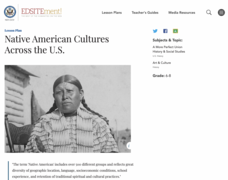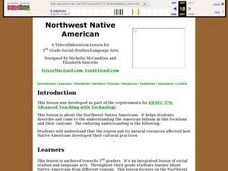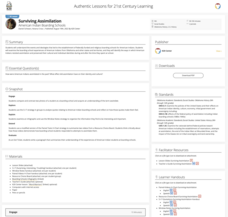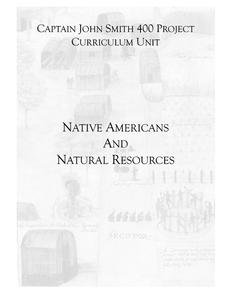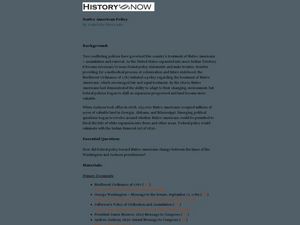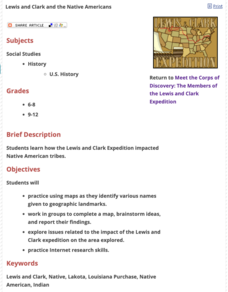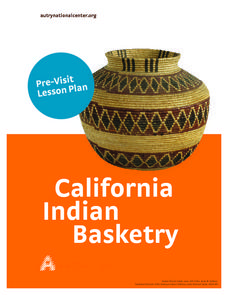National Endowment for the Humanities
Not 'Indians,' Many Tribes: Native American Diversity
Young scholars explore what they thought they knew about "Indians." They examine the Hopi, Abeneki and Kwatiutl tribes in a game-like activity using archival documents.
National Endowment for the Humanities
Native American Cultures Across the U.S.
Young scholars examine how American Indians are represented in today's society. They read stories, analyze maps, and complete a chart and create an illustration about a specific tribe.
Curated OER
Native Americans in Arkansas: The Quapaw
The Quapaw Indians of Arkansas are the focus of this American history lesson. Learners discover many aspects of the Quapaw culture, such as their dwellings, social organization, food, and how the tribe was eventually driven out of...
Montana Office of Public Instruction
Native American Culture: Counting, 1:1 Correspondence
Kindergarteners practice showing 1:1 correspondence while incorporating information they learned about a local Native American culture. The objects used for counting are taken from the previous day's Native American lesson. The intention...
Roy Rosenzweig Center for History and New Media
American Indians and their Environment
People could take a page in ingenuity and survival from the Powhatans. Deer skins became clothes, and the members of the Native American group farmed the rich Virginia soil and hunted in its forests for food. Using images of artifacts...
Curated OER
Native Americans of Our Region
Students describe the life of a Native American tribe native to their area. They form small groups and visit stations in the classroom to read about various Native American tribes. They write journal entries and draw pictures of the...
Curated OER
Northwest Native American
Third graders describe and come to the understanding the American Indians in this locations and their customs. They explain that the region and its natural resources affected how Native Americans developed their cultural practices.
Curated OER
Lesson 1: English-Indian Encounters
What did the English settlers think of the Native Americans inhabiting the Chesapeake region of the United States? Learners analyze a series of documents and images to determine the English perception of the local inhabitants. A great...
Curated OER
What It Means to Be an American Indian
Students analyze primary source documents and evaluate historical evidence to find consequences of the policies that were adopted from the 1830s to today regarding Native American Indians.
Curated OER
Jacksonian America and the Indian Removal Act of 1830
Students utilize primary sources to explore the national climate concerning Native American Indians during the Andrew Jackson administration. They are presented with opinions for and against the Indian Removial Act of 1830 as they...
National Woman's History Museum
Red Power Prevails : The Activism, Spirit, and Resistance of Native American Women
Native American women powered the American Indian Movement and other social changes, but they are often forgotten by history books. Examining a series of resources, including a documentary film, photographs, secondary sources, and social...
K20 LEARN
Surviving Assimilation: American Indian Boarding Schools
The boarding school era is "a history that all of us need to know about," says Secretary of the Interior Deb Haaland. Here's a lesson plan that examines that history. High schoolers examine video interviews of Native Americans who detail...
Curated OER
Native American Clay Pots
Learners explore world culture by conducting an art project in class. In this Native American culture lesson, students identify the types of materials American Indians utilized in their artistic endeavors, specifically clay. Learners...
Curated OER
Native Americans and Natural Resources
North American Indian civilizations had already been in place for over 10,000 years before the arrival of European settlers. Introduce your young historians to Indian tribes that lived in the Chesapeake region in the...
Curated OER
Native Americans of the Chesapeake Bay: Using Primary vs. Secondary Sources
Discover the rich Native American culture that existed at the time of early European exploration into the Chesapeake region through analysis of several primary and secondary sources.
Stanford University
Carlisle Indian Industrial School
How do policies aimed to help actually hurt? Native American boarding schools—an attempt at assimilating children of indigenous tribes into white culture—had a shattering effect on those who attended. With primary sources, including...
Curated OER
Native American Policy
Students examine federal policies regarding Native Americans. In this Native American assimilation and removal policies lesson, students conduct research to compare the changes in federal policy regarding Native Americans between the...
Curated OER
Stereotyping of Native Americans
Here is a instructional activity that covers the stereotyping of Native Americans in American culture is here for you. Learners see that there are many instances of stereotyping that are an accepted part of our society. After a lengthy...
Curated OER
Lewis and Clark and the Native Americans
Students practice using maps and identifying landmarks on the Lewis and Clark expedition. They research Lewis and Clark's relationship with the Native Americans and report their findings to the class. They identify the impact of the...
Smithsonian Institution
Borders within the United States: Indian Boarding Schools and Assimilation
Native American Nations ... sovereign entities or removable tribes? A thought-provoking lesson explores the relationship between Native American tribes and the United States, including forced assimilation and removal from their ancestral...
Smithsonian Institution
Native Resistance: Native Resistance Then and Now
Native Americans lost so much—and gained so little in return. Scholars explore Native Americans' resistance to the United States government. The lesson uses primary sources to explore the different forms of protest and gives a voice to...
Curated OER
Native Americans - Searching for Knowledge and Understanding
What do you know about American Indians? Upper graders compose an informational essay based on the research they conduct. They choose a Native American group to study and, using the provided list of web links, gather information and...
Curated OER
California Native American Basket Weaving
Fourth graders consider the role that baskets play in the traditional lives of Native Americans in California. Students investigate types of baskets and their various uses and then weave their own baskets.
Curated OER
American Indian Reservation Controversies
Learners explore the history of government relations, policies and experiences with American Indian peoples. Using the internet and other sources, young scholars research reservations, past and present. Given a real word problem,...
Other popular searches
- Art Native American Indians
- Native American Indians Nj
- Native American Indians 4th
- American Native Indians



